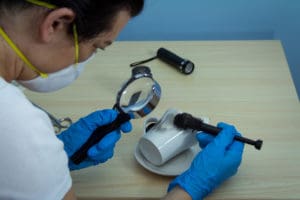How Do San Diego Search Warrants Work?
 There are three main types of warrants.
A bench warrant, which is used when a San Diego sheriff is instructed to arrest a suspect who then needs to come before the judge, usually in a “failure to appear” situation.
The second is an arrest warrant. To get an arrest warrant, an officer or prosecutor must first go before the judge with a specific complaint and if the judge decides there is enough suspicion of guilt, he or she will issue an arrest warrant for that suspect to be picked up.
The third and final warrant, the search warrant, is the most complicated. While there are some exceptions, a search warrant is also issued by a judge if there is enough “evidence of more evidence.” These complexities are the tools a good criminal defense lawyer uses to aid a client when San Diego search warrants have been issued.
There are three main types of warrants.
A bench warrant, which is used when a San Diego sheriff is instructed to arrest a suspect who then needs to come before the judge, usually in a “failure to appear” situation.
The second is an arrest warrant. To get an arrest warrant, an officer or prosecutor must first go before the judge with a specific complaint and if the judge decides there is enough suspicion of guilt, he or she will issue an arrest warrant for that suspect to be picked up.
The third and final warrant, the search warrant, is the most complicated. While there are some exceptions, a search warrant is also issued by a judge if there is enough “evidence of more evidence.” These complexities are the tools a good criminal defense lawyer uses to aid a client when San Diego search warrants have been issued.
What Is Needed for Law Enforcement to Get a Search Warrant?
When going before a judge, the requirements of an officer or prosecutor requesting a San Diego search warrant are pretty simple. They need to have: 1) evidence that a crime was committed and; 2) evidence that there is additional specific evidence of the crime in a specific location. This is dictated by the 4th Amendment of the The Constitution: “The right of the people to be secure in their persons, houses, papers, and effects, against unreasonable searches and seizures, shall not be violated, and no Warrants shall issue, but upon probable cause, supported by Oath or affirmation, and particularly describing the place to be searched, and the persons or things to be seized.” The key points of the 4th Amendment that a defense attorney will use are “describing the place to be searched” and “the persons or things to be seized.” The search warrant must be very specific, and if officials deviate from the warrant at all, any evidence collected can potentially be thrown out. The evidence may come from informants or from tips shared with law enforcement, but for a San Diego search warrant to be issued, the evidence must be corroborated by an officer of the court.When Are San Diego Search Warrants Issued?
Let’s use your neighborhood as an example. You have noticed odd activity at a particular house on a neighboring block. There was little traffic there before, but now there is a steady flow of cars at all hours of the day and night. The blinds are pulled down tight and everything is locked up securely. The only outside activity is when people come and go, they must be let in through a side door, and no one stays long. As a concerned citizen, you contact law enforcement and they follow up with observation. Through this investigation, they witness a specific delivery of illegal goods (perhaps drugs) that they also witness being stored in a specific location in the garage. That is an ideal situation for a search warrant in San Diego. That is also not very likely to happen with that much specificity, which is where a good criminal defense attorney can step in and help your case.Are There Other Types of Searches?
There are other types of searches that may be conducted more spontaneously. Consent searches, inventory searches, hot pursuit searches, and searches conducted to protect safety and prevent the destruction of evidence are usually done at the discretion of the officers and have a higher potential of being dismissed in court. If you’re served with a warrant you’ll want to call a criminal defense lawyer immediately. Usually, if you’re served with a search warrant an arrest warrant isn’t far behind. You’ll want to contact a criminal defense lawyer to help you establish a sound legal defense to protect your rights. A qualified attorney will be able to help you understand what just happened, and make sure that your legal rights are being met. If the police seize things that weren’t included in the warrant, or didn’t have a warrant when the seized them, can mean a mistrial or have that evidence thrown out.Bradley Corbett
Bradley Corbett is a criminal defense attorney in San Diego. He graduated from Brigham Young University in Provo Utah in 2004. Later he enrolled at Thomas Jefferson School of Law in San Diego where he participated in a prestigious internship program with the Los Angeles County Public Defender. Since then he has handled over 2,000 cases.

